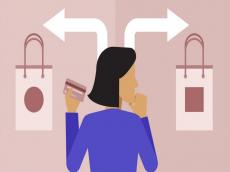|
|
TODAY.AZ / Weird / Interesting
How COVID-19 is changing our consumer behavior
03 June 2020 [16:50] - TODAY.AZ

By Azernews
By Ayya Lmahamad
Coronavirus pandemic and the lockdown imposed in many countries across the world has had a serious impact on how people shop.
This pandemic is affecting all of us: large events have been canceled; schools are closed; retailers are adjusting their operating hours or shutting their doors; restaurants are pivoting to take out or delivery; airlines are reducing operations, and states are enforcing full shelter-in-place orders.
Offline businesses began to actively use online technologies, thus many museums, shows, etc., launched online broadcasts, tours, began to implement VR/AR services.
Many things are launched online now. So, artists started to give online concerts, and fitness clubs started to offer online video trainings.
And of course, with the entry into force of the quarantine, spending has shifted and many consumers have changed their behavior. According to surveys, quarantine has affected the frequency of eating at home. Today, more consumers cook/consume food at home. The ratio of consumers who prefer cafes, restaurants and bars have significantly decreased.
Young people have learned to cook at home, and the older generation have learned to order goods online.
It is hard to predict if these behaviors are temporary, neither is it possible to identify industries that will be affected by this new consumer behavior.
According to Nielsen global studies, consumers in coronavirus-affected countries go through six stages of consumer behavior change:
Stage 1. Anticipating the epidemic. During this phase, consumers tend to buy products that help maintain their immune system and health: vitamins, nutritional supplements, fresh fruits and vegetables.
Stage 2. Proactive health care. At this stage, consumers pay attention to products that help reduce the risk of infection, such as face masks and disinfectants.
Stage 3. Preparing for quarantine. During this period, consumers are at high risk, so they proactively prepare themselves for quarantine: they purchase essential items such as cereals, pasta, coffee, tea, oil, health food and personal care products, as well as cold and hot products. This period is characterized by the growth of the consumer basket and the frequency of visits to the store.
Stage 4. Quarantine. Consumers no longer want to leave home to shop; the role of online shopping is growing. At the same time, stores may have empty shelves due to logistical restrictions.
Stage 5. A life full of limitations becomes familiar to the consumer. The buyer tends to limit his trips to the shops, the frequency of online shopping also drops. Consumers may become more price-sensitive due to shortages of goods and higher prices.
Stage 6. A new normal life. Consumers are returning to their usual routine activities, educational institutions, offices and shops are being opened. However, new habits that were formed during quarantine, such as attention to their health and shopping, remain.
The study also found out that consumers typically moved from one stage to another in a period of two weeks in areas close to the initial outbreak.
Some researchers believe that it’s not only the assortment of purchases of citizens that is changing but also the time of visiting the shops. Previously, evening would be the most common time of the day for shopping as most people used to go to work. Now many people try to make purchases during the day. Because of this, there is a change in the working hours of the stores. Some of them have already announced that they do not work 24 hours a day. It's now economically unprofitable to work 24 hours a day.
As it was previously said, COVID-19 will change our lives, and the habits that were formed during quarantine will probably stay with us forever. It’s hard to tell what benefit or harm it has but there is one thing we can be sure of - is time to learn to adapt to new world.
URL: http://www.today.az/news/interesting/194281.html
 Print version
Print version
Connect with us. Get latest news and updates.
See Also
- 19 February 2025 [22:20]
Visa and Mastercard can return to Russia, but with restrictions - 05 February 2025 [19:41]
Japan plans to negotiate with Trump to increase LNG imports from United States - 23 January 2025 [23:20]
Dubai once again named cleanest city in the world - 06 December 2024 [22:20]
Are scented candles harmful to health? - 23 November 2024 [14:11]
Magnitude 4.5 earthquake hits Azerbaijan's Lachin - 20 November 2024 [23:30]
Launch vehicle with prototype of Starship made its sixth test flight - 27 October 2024 [09:00]
Fuel prices expected to rise in Sweden - 24 October 2024 [19:14]
Turkiye strikes terror targets in Iraq and Syria - 23 October 2024 [23:46]
Kazakhstan supplied almost entire volume of oil planned for 2024 to Germany in 9 months - 23 October 2024 [22:17]
Taiwan reported passage of Chinese Navy aircraft carrier near island
Most Popular
 The Armenian Crusade: The Vardanians are trying to play the religious card against Baku
The Armenian Crusade: The Vardanians are trying to play the religious card against Baku
 Energy Minister addresses GWU forum honoring Azerbaijan's National Leader, Heydar Aliyev
Energy Minister addresses GWU forum honoring Azerbaijan's National Leader, Heydar Aliyev
 Azerbaijan Fashion Week: Designers of East present collections inspired by Great Silk Road
Azerbaijan Fashion Week: Designers of East present collections inspired by Great Silk Road
 Baku’s Embassy in Pretoria honors National Leader Heydar Aliyev
Baku’s Embassy in Pretoria honors National Leader Heydar Aliyev
 Kazakhstan hopes for swift peace treaty between Azerbaijan and Armenia
Kazakhstan hopes for swift peace treaty between Azerbaijan and Armenia
 First VP Mehriban Aliyeva shares post on commemoration day of National Leader Heydar Aliyev
First VP Mehriban Aliyeva shares post on commemoration day of National Leader Heydar Aliyev
 President Ilham Aliyev shares post on commemoration day of National Leader Heydar Aliyev
President Ilham Aliyev shares post on commemoration day of National Leader Heydar Aliyev
